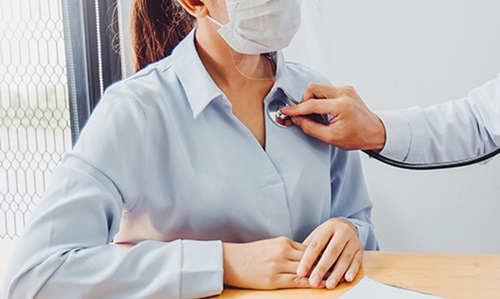Cardiac Arrest
Featured Expert
What is cardiac arrest?
Cardiac arrest, also known as sudden cardiac arrest, is when the heart stops beating suddenly. The lack of blood flow to the brain and other organs can cause a person to lose consciousness, become disabled or die if not treated immediately.
If a loved one experiences symptoms of cardiac arrest, call 911 immediately. Many states require an automated external defibrillator (AED) to be available in public spaces. If you have access to an AED, follow the directions on the device to administer support until medical help has arrived.
Johns Hopkins cardiologist and ventricular arrhythmia expert Jonathan Chrispin, M.D., explains symptoms, causes and treatments of cardiac arrest.
What are the symptoms of cardiac arrest?
In some cases of cardiac arrest, there may be no symptoms at all. You may experience these symptoms prior to cardiac arrest:
- Fatigue
- Dizziness
- Shortness of breath
- Nausea
- Chest pain
- Heart palpitations (fast or pounding heart beat)
- Loss of consciousness
Symptoms of cardiac arrest can be life-threatening.
Call 911 or go to the ER: If you have heart problems such as chest pains, dizziness, shortness of breath or sudden numbness, get help immediately.
Stay on Top of Your Heart Health

If you have a new or existing heart problem, it's vital to see a doctor. Our heart health checklist can help you determine when to seek care.
What causes cardiac arrest?
Cardiac arrest can be caused by a heart condition, or it can occur unexpectedly. However, there are three main causes of cardiac arrest:
- Arrhythmia and ventricular fibrillation: Arrhythmia occurs when electrical signals in the heart are the problem leading to an abnormal heartbeat. Ventricular fibrillation is a type of arrhythmia and is the most common cause of cardiac arrest. Ventricular fibrillation is a rapid heartbeat in the heart’s ventricle, which causes the heart to tremble instead of normally pumping blood.
- Enlarged heart (cardiomyopathy): The heart muscle dilates or thickens, leading to abnormal contractions of the heart.
- Coronary artery disease: This type of heart disease occurs when the coronary arteries are narrowed and thickened by blockages of plaque, which restricts the flow of blood to the heart. If left untreated, coronary artery disease can lead to heart failure or arrhythmias, which both can lead to cardiac arrest.
Other causes of cardiac arrest may include:
- Blood loss
- Valvular heart disease
- Lack of oxygen
- High levels of potassium and magnesium (can cause arrhythmia)
Am I at risk for cardiac arrest?
Several lifestyle and hereditary factors may increase the risk of cardiac arrest. They include the following:
- Alcohol or drug abuse
- Family history of heart disease or cardiac arrest
- Heart disease
- High blood pressure
- High cholesterol
- Low potassium or magnesium (nutritional deficiency)
- Obesity
- Smoking
Some people may experience cardiac arrest with no risk factors at all. Cardiac arrest is more common in older men than women.
What’s the difference between cardiac arrest and a heart attack?
The terms ‘heart attack’ and ‘cardiac arrest’ are often used interchangeably, but these are two different heart conditions.
A heart attack occurs when there is a blockage in the arteries that stops blood flow in the heart. Due to the lack of blood and oxygen flowing in the heart, the heart muscle tissue will become damaged. Heart attacks can increase the risk for cardiac arrest because heart attacks can alter electrical signals in the heart. When cardiac arrest occurs suddenly with no other existing heart conditions, it’s more likely to be caused by a heart attack.
How is a cardiac arrest treated?
If someone experiences cardiac arrest, they need immediate treatment to increase the flow of oxygen-rich blood to their organs.
Cardiopulmonary resuscitation
The first line of treatment is usually cardiopulmonary resuscitation (CPR), during which another person compresses the chest to increase blood flow to the organs. CPR can temporarily treat cardiac arrest until more advanced emergency treatment is available to the person experiencing cardiac arrest.
Defibrillator
Once emergency medical service personnel arrive, they will use a machine called a defibrillator to send an electric shock to the heart to help it regain function and beat normally. This treatment should be used immediately to save the person’s life and reduce further organ damage from oxygen and blood deprivation. Defibrillators are used by trained first responders.
Some public areas may have an automated external defibrillator (AED), which is similar to a defibrillator, but an AED can detect harmful arrhythmias and deliver an electric shock to the heart. This device is designed for nonmedical personnel, and it can be used by anyone.
Once the patient is hospitalized, a doctor will run several tests to determine the cause of the cardiac arrest and treat the condition once diagnosed. Patients may undergo surgical treatment or receive medication.
What is the recovery process after cardiac arrest?
Cardiac arrest can lead to death if there is no treatment within minutes. This condition is one of the largest causes of natural death in the United States.
After being released from the hospital, a doctor will provide guidelines for lifestyle changes, if needed, to reduce the risk of cardiac arrest or further complications. Routine appointments may be scheduled with a cardiologist, who will examine the function of the heart’s electrical system and develop a treatment plan to maintain normal electrical levels.
How can I prevent cardiac arrest?
You can reduce lifestyle factors that may increase your risk of cardiac arrest and other acquired heart diseases by:
- Eating heart-healthy meals
- Losing weight
- Exercising
- Quitting smoking and drug use
- Reducing alcohol intake
Cardiology at Johns Hopkins

Our world-renowned cardiologists at Johns Hopkins provide treatment, prevention and management for all kinds of heart conditions in the Baltimore and Washington, D.C., area.






